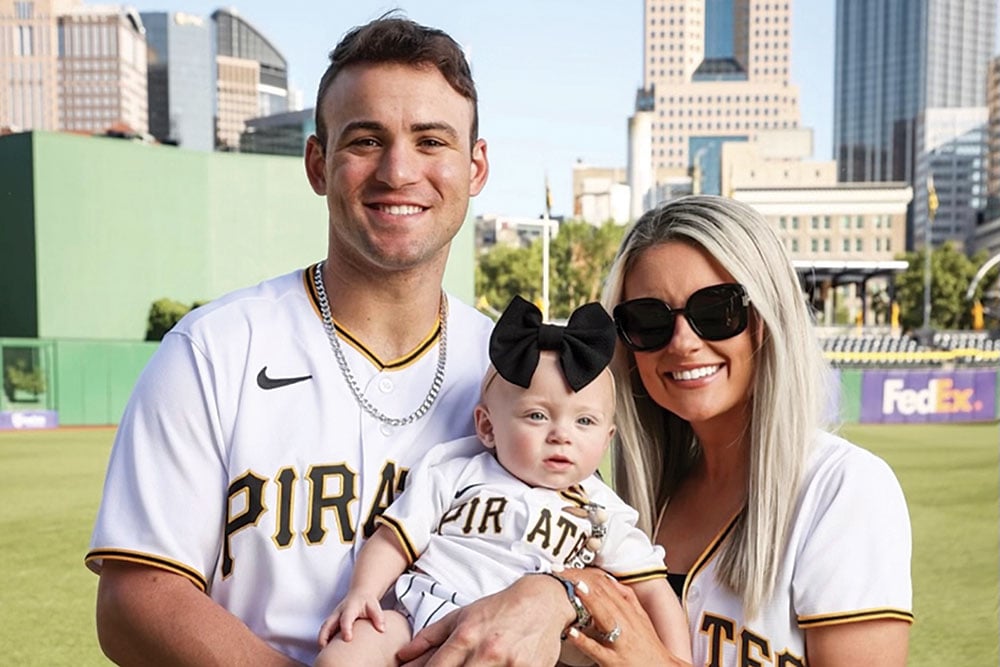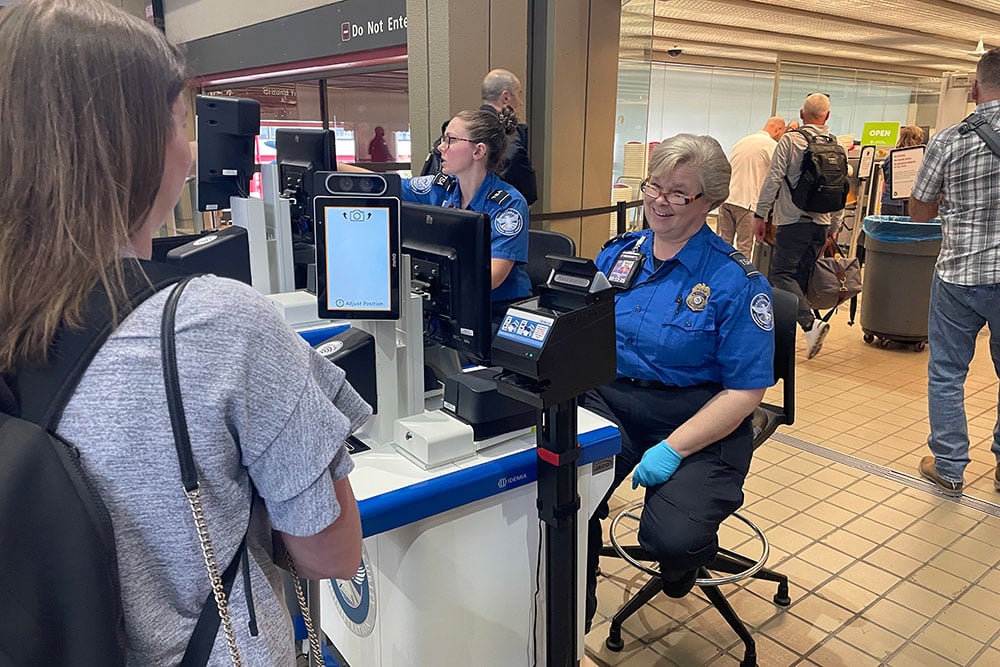Marriage and Baseball: What’s It Like For the Wives of Pittsburgh Pirates?
As a new Pittsburgh Pirates season opens, spouses of some of the players share their view of life from the stands and on the road.
Peyton Swaggerty started dating her husband, Travis, when she was still in high school. As a freshman at the University of South Alabama, Travis was a star baseball player, with an eye toward the future.
“His goal was always to make it to the majors and play baseball professionally,” Swaggerty says. “So a lot of our date nights were just me feeding the pitching machines and him hitting in the cages.”
Travis was drafted by the Pittsburgh Pirates in 2018 as the league’s 10th overall pick. In New York for the draft, Peyton and his family cheered him on.
“When they announced his name, it was just unbelievable,” she says. “It was like watching his dreams come true in that very moment.”
And just like that, Peyton was thrust into a new club of her own: A group of wives and girlfriends of professional baseball players who band together as they navigate relentless travel, near-nightly games and the uncertain future that comes with being a pro athlete’s partner. As the Pirates gear up for another season, six wives and partners of current players share with us the highs and lows of the lifestyle — and why they form such strong bonds both on and off-season, staying connected through massive group texts and family trips.
Planning for Changed Plans
In this walk of life — like any other — there’s often a lot going on behind the scenes.
“Three days [after the draft], I found out I had cancer,” Swaggerty says. “At the draft, my mom actually noticed the lump on my neck, but she didn’t want to freak me out.”
Swaggerty was diagnosed with stage 2 thyroid cancer and underwent surgery soon afterward; she has been cancer-free since then. She and Travis got engaged a few months later, a short time into his professional career.
“That’s why we got married,” says Swaggerty. “I was like, life is so short. I wanted to have kids right away, and we had [our daughter] Sutton nine months to the day after our wedding.”
The wedding, of course, was held in December.
“We all get married in the winter,” laughs Darci Brubaker, whose husband, JT, made his MLB debut with the Pirates in 2020. “Winter weddings happen a lot with baseball families because you don’t really have time for that in the season.”
That means that engagements, weddings and births are planned for those few months when baseball is off.
Life for pro baseball families is a fun existence, they say, but a lot of work. And, while it may look glamorous from the outside, with million-dollar contracts and constant travel, the wives say that supporting their partners comes with a whole host of sacrifices.
A Unique Lifestyle
It’s not unusual for a professional baseball player’s year to be divided into three places: their home base (typically close to family and where they grew up), Florida for two months of spring training, then their team’s home city for the rest of the year.
And that’s just for players who have made it to the 40-man roster in the big leagues.
Life, on the other hand, doesn’t always fit neatly into that three-location schedule.
“I was due in August last year with [my son] Jett, so I came back home to Ohio at the very end of July because I wanted to deliver here,” Brubaker says. “The guys — all the players and coaches — they only get three days for a birth. So, I had him, and then we had to do the distance apart until JT was able to come home the first week of October. Hopefully we’re going to plan our next child a little bit better and push him a little more into the off-season, because anything that happens during season, it’s all about baseball.
“It’s a unique lifestyle,” she adds. “It’s hard to explain to even your girlfriends back home — who will be like, ‘What do you mean you move three times a year?’”
Hilary Crowe, wife to Pirates pitcher Wil Crowe, says that keeping a home base in South Carolina, where she and Wil grew up, is important for their family’s sanity and offers a way to stay connected to both sets of their parents. The Crowes spend October through February in South Carolina, then head to Florida together for spring training.
“After that, we’re in Pittsburgh for six months,” she says. “So we just kind of switch back and forth and do that rotation throughout the year.”
For families with older kids in school, that can be much harder, Crowe says, as they have to juggle school schedules and kids’ activities. She and Wil have a 16-month old son, Koa, who is mostly happy to go with the flow and toddle around wherever he happens to be. That’s why — for now, at least — “we’re doing the whole shebang as a family,” she says.
That means that Crowe packs up Koa for lots of long nights at the ballpark and travels — at their own expense — to most of the away games to be with her husband.
“The wives pretty much set everything up,” she says. “If we want to go on a trip, we set up our own travel plans to get to the airport, our own flights, and figure out how to get to the hotel. The team is really great and will provide transportation in some of the cities from the hotel to the field, but most of the time, it’s up to us.”
It’s a struggle to plan and execute, but they’ve decided as a couple that it’s important. During the regular season, a typical schedule for the team is roughly seven days in Pittsburgh, then seven days on the road.
For many families, that’s just too long to be apart.
“During the two seasons that we’ve had with the Pirates, we’ve traveled on the road with Wil as much as we can,” says Crowe. “I can get to a point sometimes where I’m like, ‘Oh, this is a lot.’ But on the flip side, I know that if I don’t, [Koa’s] missing that time with Wil, where they could be sharing a special moment together on the road.”
Swaggerty also brings her infant daughter along to almost all of the away games — and all of the home games, too.
“We wives get together, fiancées and girlfriends, and we all try to make sure we’re on the same flight. And it’s all hands on deck, because the majority of us have kids.”
“I see the moms, oh, my God, the super moms, the moms who have kids in the baseball world,” says Emma Henzes, pitcher Max Kranick’s fiancée. “They’re traveling alone, they’re not traveling with their significant other. But people do it, and it’s amazing.”
So many late nights at the ballpark mean that some of the wives have imposed non-traditional schedules on their babies, too.
“We actually made our daughter’s sleep schedule a baseball schedule from the beginning,” Swaggerty says. “She goes to bed about 10 every night, and will get up around 8 a.m. My friends have babies that go to bed at, like, 6:30, and I say, ‘Uh uh, the game hasn’t even started yet.”
During home games, the Pirates organization provides child care for families at the field, along with family parking, extra tickets, prime seating and other perks.
“With Mitch being a starting pitcher, he only plays every five days,” says Clancy Keller, who is married to Mitch Keller. “I for sure go to every game that he starts in. And, I usually go on the weekends, because that’s my social scene, to see my friends. But, I mean, 162 games in a year is kind of a lot.”
Sudden Moves and Paused Careers
Then there’s the constant potential for trades. Players can get traded at any time throughout the season, usually with only a few hours’ notice.
“I know that eventually it’ll happen,” says Henzes, who became engaged to Kranick in December. “Everyone in baseball gets traded or moves rosters … you could be on to a new place on the other side of the country, you could go to Japan, you could go to Korea, all those are possibilities. But that’s OK with me. I love to travel. You kind of have to be that way with this.”
Even within an organization, there’s a lot of uncertainty and movement, with players being sent back and forth from various minor league teams as rosters change.
“Max has bopped up and down from so many different leagues, from the minors to the majors, and all over the place,” Henzes says. “Once, I was taking a flight to Charlotte, [North Carolina], only for him to get called up. And then, I had to go on a work trip to Miami, so I get to Miami, thinking I’m going to be heading out to Pittsburgh, and then all of a sudden, he’s back in Charlotte for now, but has to go to Indianapolis the next day.
“I’m just really, really close with American Airlines.”
Crowe, whose husband was traded from the Washington Nationals in 2020, says having gone through a trade within her own family has helped her to offer better support to other wives who may go through it.
“If the guys are traded midseason, they’re on a plane to wherever and they’re gone. And we’re sort of left to figure out how to move, how to get things packed up, deal with the lease situation and all that,” she says.
It’s often a moment when the whole group of wives and girlfriends come together.
“Having seen women who have done the moves, it’s like, ‘Hey, I’ll come over and help you pack up your boxes, we’re going to help you get everything together, and you’re going to be able to go in 8 hours like you need to,’” says Brubaker. “There really is such a community around you.”
Living with that kind of uncertainty can put a damper on the wives’ own career ambitions. It’s tough to grow a career when the threat of moving is always at the forefront, though some of the wives say that the shift to remote work because of the pandemic has helped them continue their professional life while still being able to be present with their partner.
Henzes is able to work remotely as a market and content manager for a nonprofit organization that helps women get into the sports tech industry.
“It’s really important for me to have my own thing,” she says. “Baseball is such an all-consuming world. And it’s really cool to be a part of, and it’s been really meaningful that I could find a nonprofit that I’m really passionate about, while still being able to support Max and physically be here.”
Casey Holderman, married to pitcher Colin Holderman, works as a nurse at a fertility clinic near their home in Texas but will be making the move to Pittsburgh for the season.
“I’m having a hard time leaving this job just because it’s a job that I’m very passionate about,” she says. “I know there are other jobs that are better for remote options, but nursing is one of those that it’s important to be in person.”
After she moves to Pittsburgh, she’ll be able to continue some parts of her job remotely. “I’m very fortunate that my coworkers and the doctors I work for have been very supportive and understanding,” she says.
While the Pirates organization doesn’t have an official liaison for the families, the women say they offer support throughout the season, from throwing a baby shower for the moms-to-be last year and hosting a regular Bible study with the team chaplain.
“When I was in preterm labor with our son in Pittsburgh, [the organization] was able to set up being able to go to the hospital so they knew that we were coming,” Crowe says. “As far as those kinds of things are concerned, we have a lot of people in our corner to help make our lives easier in a city where we don’t have anyone.”
And the women make it a priority to be there for each other.
“We truly have become a family,” Swaggerty says. “It takes a village for sure. Only a few people can understand our lifestyle in baseball, and they definitely have become like my sisters.”
Emily Catalano is a writer and founder of Highly Social Media, a social media and influencer marketing agency. She also runs the website Good Food Pittsburgh.




















